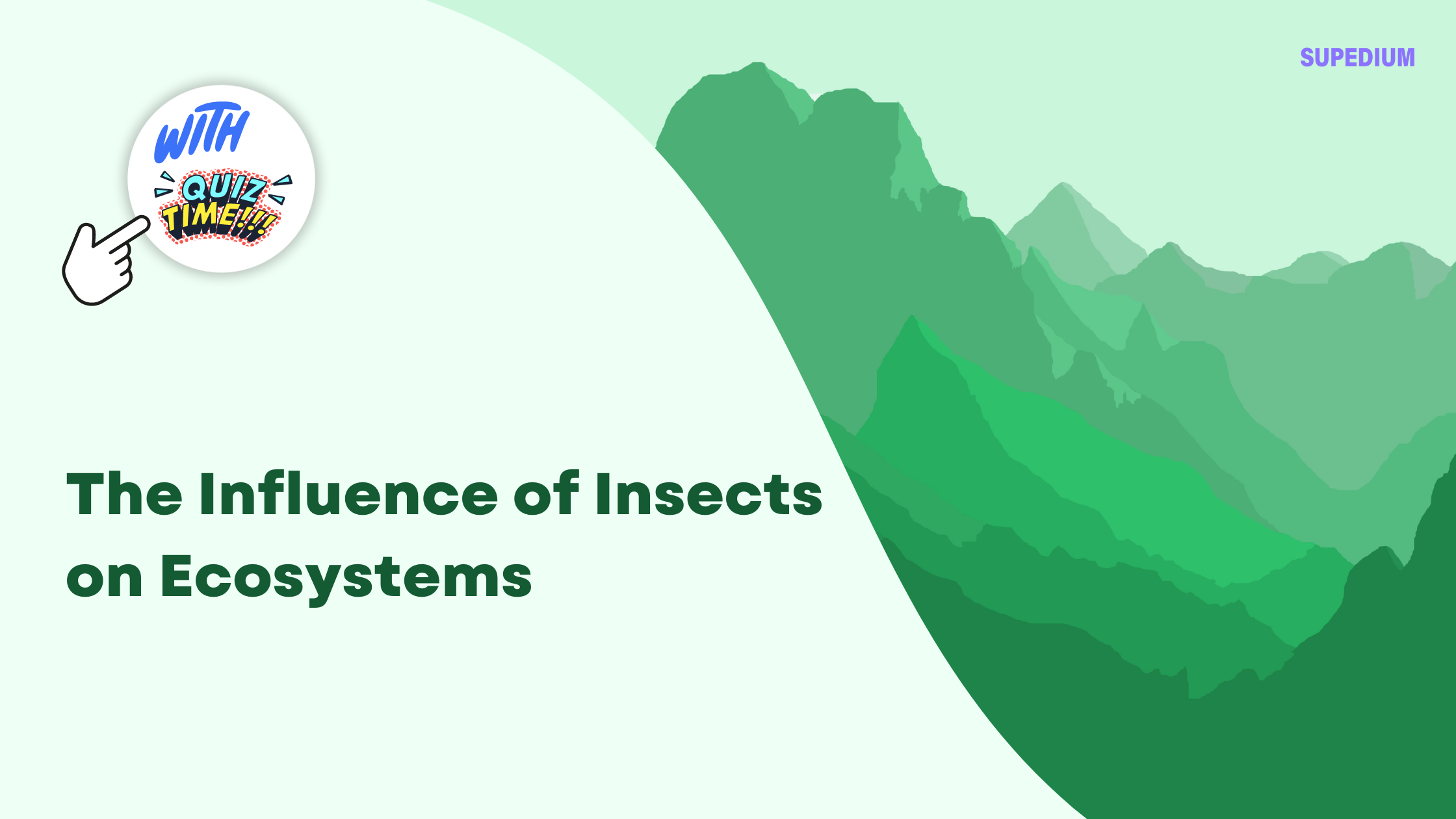Table of Contents
![]()
Insects, often overlooked in discussions about ecosystems, play crucial roles that impact various ecological processes. Their influence on ecosystems is profound, affecting everything from pollination and nutrient cycling to food webs and ecosystem stability. This article explores the diverse roles of insects, their impact on ecosystems, human-induced challenges they face, and the strategies for their conservation.
I. Introduction
Ecosystems are dynamic systems comprising both biotic (living organisms) and abiotic (non-living elements) components interacting in complex ways. Insects, with their remarkable diversity and abundance, are integral to these systems. They are among the most numerous and varied groups of organisms on Earth, contributing significantly to ecosystem functions and services.
II. Insect Diversity and Distribution
Insect Diversity: Insects represent the most diverse group of organisms on Earth, with an estimated 10 million species, though only about 1 million have been formally described. Major orders include beetles (Coleoptera), butterflies and moths (Lepidoptera), flies (Diptera), and ants, bees, and wasps (Hymenoptera). Each group plays specific roles in their respective ecosystems.
Distribution Across Ecosystems: Insects inhabit virtually every environment on Earth, from tropical rainforests and temperate woodlands to arid deserts and aquatic habitats. In terrestrial ecosystems, they can be found in soils, on plants, and in leaf litter. In aquatic ecosystems, insects such as dragonflies and mayflies are crucial components of both freshwater and marine systems. Urban environments, too, host a variety of insect species adapted to human-modified landscapes.
III. Roles of Insects in Ecosystems
Pollination: Insects are vital pollinators for many plants, including a substantial portion of crops used in agriculture. Bees, butterflies, and moths transfer pollen from one flower to another, facilitating plant reproduction. This process is essential for the production of fruits, seeds, and vegetables, which directly supports human food systems and biodiversity.
Decomposition and Nutrient Cycling: Insects play a key role in breaking down organic matter. Detritivores, such as beetles, ants, and certain flies, decompose dead plants and animals, converting them into nutrients that enrich the soil. This decomposition process is crucial for nutrient cycling, maintaining soil fertility, and promoting plant growth.
Pest Control: Many insects serve as natural pest controllers. Predatory insects like ladybugs and lacewings consume harmful pests that damage crops and plants. Parasitic insects, such as certain wasps, lay eggs on or inside pest species, ultimately controlling their populations. This biological control reduces the need for chemical pesticides and supports agricultural sustainability.
Food Source for Other Animals: Insects are a fundamental food source for many animals, including birds, amphibians, reptiles, and mammals. Their abundance and nutritional value make them critical in supporting higher trophic levels within food webs. This role underpins predator-prey relationships and contributes to ecosystem balance.
IV. Insects and Ecosystem Stability
Insect Impact on Ecosystem Resilience: Insects contribute to ecosystem resilience by maintaining ecological processes and responding to environmental changes. For example, their role in pollination and decomposition supports ecosystem functions that can help ecosystems recover from disturbances. Diverse insect communities can enhance ecosystem stability and adaptability.
Effects of Insect Declines: Declines in insect populations can have cascading effects on ecosystems. Reduced pollination can lead to decreased plant reproduction and lower crop yields. Slower decomposition rates can affect soil health and nutrient availability. Disruptions in food webs can impact predator species and overall ecosystem stability.
V. Human Impacts on Insects and Ecosystems
Habitat Loss and Fragmentation: Human activities such as deforestation, urbanization, and agriculture lead to habitat loss and fragmentation, disrupting insect populations. The destruction of natural habitats reduces the availability of food sources, breeding sites, and shelter, leading to declines in insect diversity and abundance.
Pesticide Use and Chemical Pollutants: The use of pesticides and chemical pollutants can negatively affect insect health and behavior. Insecticides can be toxic to non-target species, including beneficial insects, and disrupt ecological functions. Pollutants can also impair insect reproductive and developmental processes, further contributing to population declines.
Climate Change: Climate change alters temperature, precipitation patterns, and seasonal dynamics, affecting insect distributions and behaviors. Changes in climate can lead to shifts in insect populations, changes in migration patterns, and disruptions in ecological interactions. For example, earlier springs may affect the timing of insect emergence and plant-pollinator interactions.
VI. Conservation and Management Strategies
Protecting Insect Habitats: Conserving insect habitats involves establishing and maintaining natural reserves, protecting native vegetation, and creating insect-friendly environments in urban areas. Initiatives like planting native flowers, reducing pesticide use, and preserving wetlands can support insect populations and their ecological roles.
Sustainable Agricultural Practices: Adopting sustainable agricultural practices, such as Integrated Pest Management (IPM) and organic farming, helps protect insect populations. IPM combines biological, cultural, and mechanical methods to manage pests while minimizing chemical use. Organic farming practices reduce reliance on synthetic pesticides and support healthy insect communities.
Research and Monitoring: Ongoing research and monitoring are crucial for understanding insect populations and their roles in ecosystems. Citizen science initiatives and monitoring programs help track insect diversity, abundance, and health. This information is essential for developing effective conservation strategies and addressing emerging challenges.
VII. Case Studies
Tropical Rainforests: In tropical rainforests, insects contribute to high biodiversity and ecosystem functions. They play roles in pollination, decomposition, and nutrient cycling. Deforestation poses significant threats to insect populations in these ecosystems, leading to reduced biodiversity and altered ecological processes.
Agricultural Ecosystems: In agricultural systems, insect pollinators enhance crop yields and support food production. Managing pest insects through biological control and integrated pest management helps maintain crop health and reduce environmental impacts. Effective strategies balance the needs of agriculture with the conservation of beneficial insect species.
VIII. Conclusion
Insects are indispensable to the functioning and stability of ecosystems. Their roles in pollination, decomposition, pest control, and as a food source underscore their importance in maintaining ecological balance. However, human activities and environmental changes pose significant challenges to insect populations. Addressing these challenges through habitat conservation, sustainable practices, and research is crucial for preserving the vital roles insects play in ecosystems. Protecting insects not only benefits biodiversity but also ensures the continued provision of essential ecosystem services that support both natural environments and human societies.






Be the first to comment